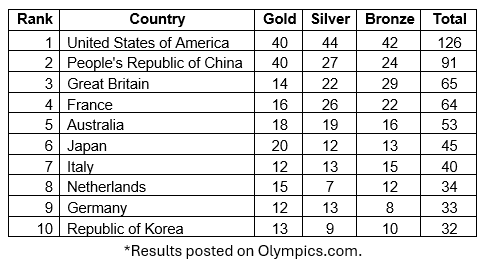In the US we highly revere and idolize our athletic heroes. During the Summer of 2024, over 600 American athletes competed for medals at the Olympic Games in Paris. As a result of their skills and training, 257 of these athletes brought 126 medals back to their mantels and trophy cabinets. (Any winning teams or squads count as 1 medal but could include many athletes). Here are the results for the top 10 countries for number of medals won:
These medalists not only won the cheers of adoring fans and prize money but also attracted sponsorships, endorsements, and appearance deals, capitalizing on their success. Winning American Olympic medalists got to climb a podium on the world stage and see our flag raised high above the crowd. Now that the ceremonies and photo-ops have ended, and they have descended from the podiums, they must now face the reality of navigating the financial complexities that accompany their newfound success. However, this fame and potential fortune come at a cost, and athletes must consider key factors to protect their earnings.
Navigating the “Jock Tax” (yes, this is the official name of the tax)
Taxes are levied by varying sizes of jurisdictions. Athletes competing internationally may be subject to any income earned while competing abroad and for any other deals generated with foreign entities. Domestically, any athlete or person connected to a team that earns income by travelling to compete can be subject to “Jock Taxes”. This is a term for taxes levied by jurisdictions where athletes compete, regardless of where they live or where their team is based. These taxes have been around for a long time, but received modern notoriety in 1991, when California assessed specific state income taxes against the Chicago Bulls, after the team defeated the Los Angeles Lakers in the NBA finals. In what appeared to be retaliation, Illinois enacted a law nicknamed, “Michael Jordan’s Revenge,” which would specifically tax visiting teams playing in Chicago. The jock tax now affects athletes in nearly every state, potentially carving thousands of dollars out of their incomes each year depending on where they play. In some cases, these taxes amount to hundreds of thousands over a career.
With professional athletes potentially facing thousands of dollars in taxes during a season, amounting to hundreds of thousands over a career, this side of these nuanced jurisdictional taxes gets a lot of attention. But any individual who earns money by and while traveling needs to be aware of these types of taxes, including business executives and board members. Anyone who owns or leads a business that operates or sells goods in multiple jurisdictions needs to be aware of the varying nature of sales, use and business privilege taxes. These taxes are typically well documented and even programmed into most market accounting software. The locality-specific taxes related to payroll taxes can be much more complicated to track. There are companies with entire teams of people dedicated to evaluating the intricacies of local tax regulations, as the rules can be applied to every individual taxpayer very specifically.
Here is an example of what could happen to someone who is a business executive and board member that travels for meetings. Let’s assume this person lives in southern New Jersey and commutes to work in the Philadelphia suburbs. When they work in today’s typical hybrid fashion, they will be responsible for paying tax to New Jersey, their local municipality, to Pennsylvania, and to the local municipality of their office. If they attend a board meeting in Philadelphia, the income derived from this meeting is then further subjected to Philadelphia’s income tax. If this person then attends meetings at their company’s headquarters in New York City, a convenient train ride on New Jersey Transit, all their income can be subject to New York (state) and New York City income taxes. If they add additional board meetings or business visits out to California, their income gets further taxed. If this person isn’t having constant communications with the people responsible for payroll withholdings, there can be a wide variance between what was withheld during the year and their actual tax liability. It is important to keep track of business travel details to share with your tax accountant, because there can be a significant difference between what various authorities will accept as tax payments and what is actually due to them.
Planning Ahead: Building a Financial Team
It is important for both athletes and businesspeople to surround themselves with a knowledgeable team “off the field” to protect their winnings “on the field”. Just as athletes rely on coaches and trainers for their physical performance, they need financial planners and tax experts to help manage their wealth. Financial and tax planning is paramount for professional athletes to protect their lifestyles while on active rosters and when preparing for retirement. Taxes are one of the few unavoidable facts of life, but they can be planned. Many young professionals, including athletes, new to being taxpayers, are not experienced with, and often underestimate, the amount of money that gets withheld or becomes due as taxes. A comprehensive financial plan should project and forecast taxes as a consideration in setting lifestyle priorities, budgeting, and retirement goals. Working with experts, such as the team at Baldwin Management, ensures that athletes’ financial game plans are as strong as their performance on the field. By projecting future tax liabilities, athletes can avoid surprises and maintain their lifestyle during their careers and well into retirement.
Conclusion: Stay Ahead of the Game
While taxes are unavoidable, they absolutely do not have to catch people off guard. With the right planning and a trusted team of advisors, taxpayers can navigate complexities, like the jock tax and other financial hurdles, ensuring that their focus remains where it belongs, achieving their goals, both on and off the field.
At Baldwin Management, we are here to help our clients build a solid financial foundation, protecting their earnings today and securing their futures for tomorrow.
Benjamin Meck, CPA
Tax/Accounting Associate
Benjamin joined Baldwin Family Office in 2023 after spending 8 years gaining experience in corporate, cost, construction, and property accounting. He holds a B.S.B.A in both Accounting and Finance from Bloomsburg University of Pennsylvania. He earned the CPA designation in 2022. He is a member of the Pennsylvania Institute of Certified Public Accountants and the National Association of Tax Professionals.


